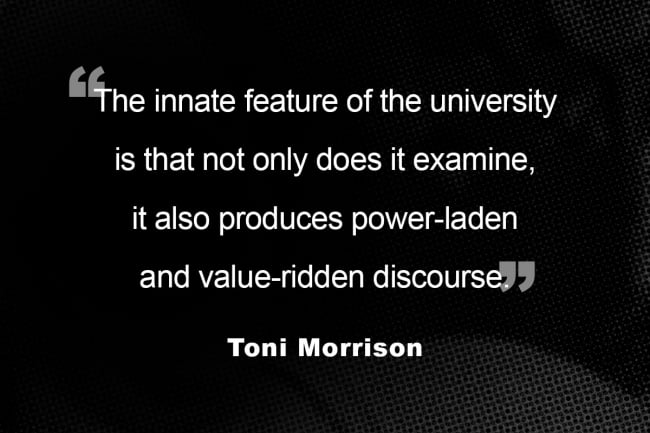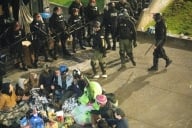You have /5 articles left.
Sign up for a free account or log in.

Photo illustration by Justin Morrison/Inside Higher Ed
Samuel Beckett, who served in the French Resistance, asks in Waiting for Godot: “Was I sleeping, while the others suffered?” Since October, that line has been ringing in my ears. I have watched as my university and other universities Did the Right Thing by condemning the attack on Israeli civilians. I’ve read epistolary pieces—from the chancellor of the City University of New York, where I teach, from CUNY college presidents, other university presidents—that rightly and in the most passionate terms defend the right to life of the Israeli people. Much love has been shown, which I and others—people who care about Jewish people, about Israeli people, who recognize antisemitism as the disgrace it is—are much relieved to see.
Since then, haunted by Beckett, I am likewise eclipsed by waiting. I wait every day for the Godot that doesn’t come, for my university and other universities to censure actions taken by the state of Israel in Gaza in the time since Oct. 7.
On this tiny strip of land, the Associated Press reports that between October 2023 and April 2024 more than 34,000 persons have been killed, mostly civilians. More than 76,000 are wounded.
Even as student protests on behalf of Gazans grow at campuses across the country, when it comes to university leadership, I find nothing to witness as a response to this, nothing but a loud, long silence. I appreciated seeing the open letter from faculties of North America condemning “Israel’s systematic attacks on educational life in Gaza.” I saw my faculty union, the Professional Staff Congress-CUNY, join the mass labor union call for a ceasefire. Another unique and active university voice during this time has been Judith Butler, former president of the Modern Language Association.
Those expressions of public opinion are vital. But when it comes to university leadership, I find just one response defending Gaza and calling for the violent bombardment to stop. It is from Michael Roth, president of Wesleyan University; he threw down a gauntlet in publicly declaring his support for a ceasefire and by urging the education sector to lead.
Is the university sleeping while Gaza suffers, at a time when leadership is so urgently necessary? Are we, like so many of our governmental representatives, sold out to multinationals, beholden to profit-driven corporate interests? Does this explain the bit that appears to harness us? Or, did university leadership “die” with Toni Morrison when she transitioned in 2019? A constant inspiration across my time in academia, she surfaces again in this moment.
Morrison gave a talk at Princeton University at the turn of the present century; I extract this piece from her formidable oeuvre because it is both relevant and prophetic. In “How Can Values Be Taught in the University?” she argued, “the commitment of higher education was to train leaders to envision, if not effect, a desirable future.” Not only is the university under attack by a sweeping gag-order phenomenon and continuous assaults on the humanities, we are now, by our silence, forced to confront Morrison’s interrogation: Are we not responsible for building a “desirable”—a democratic, equitable, sustainable, peaceful, anti-racist—future?
Speaking 24 years ago, Morrison warned us about challenges institutions of higher learning would face in the century to come: “Which values, in act or symbol, should a public institution of learning reject, endorse, or tolerate?” she asked. And she pointed to the “initiatives … in place at many universities”—among them the formal encouragement of volunteerism and public service and the establishment of centers focused on questions of ethics and values—that vouchsafe the university’s function as a value-laden and value-defining topography. She observed that such initiatives “impress upon the student body the seriousness in which the university holds these matters—a seriousness which stresses and clarifies the university’s definition of a complete and sophisticated education.”
Arguing that “we teach values by having them,” Morrison anticipated a future time when educational leaders would fail to lead in the face of egregious world events:
“If the university does not take seriously and rigorously its role as guardian of wider civic freedoms, as interrogator of more and more complex ethical problems, as servant and preserver of deeper democratic practices, then some other regime or ménage of regimes will do it for us, in spite of us, and without us.”
Rather than act as bulwark against a military attack on children, the university appears to join the ménage Morrison foresaw, situating itself as one link—with the U.S., Britain, and the E.U.—in a chain of silence, in the collective failure to defend and protect occupied Palestine.
But the university is not the nation-state. Collectively, globally, universities shoulder longstanding and indeed precious duties, including the obligation to lead in the face of political outrage, to function as a fortifier against fascism, racism, antisemitism, Islamophobia, trans- and homophobia, colonial violence, and gender violence. Our critical precious task is to teach critical thinking—to know, then teach, then lead around democratic citizenship and political exile, international human rights and genealogies of morals. What value, what ethic is informing our much protracted quietude?
Some universities rush to adopt the policy of the moment wrongly named “institutional neutrality,” a concept, Roth notes, built on the questionable logic that the silence of university leaders “somehow is supposed to encourage more thoughtful speech from others.” It is a “smart” circuitous argument that allows the silence and inaction to carry on but crumbles fast under scrutiny. Quite apart from “thoughtful speech,” those policies create a halting vacuousness of leadership, a void quickly filled by the “regimes” Morrison warned of, the sham interrogations of college presidents on Capitol Hill being illustrative of this fact. Roth insists, and I agree, that “[s]ilence at a time of humanitarian catastrophe isn’t neutrality; it’s either cowardice or collaboration.”
Leadership precisely means standing in the space of articulation. Recognizing, as Morrison writes, that “the innate feature of the university” is that it both “examine[s]” and “produces power-laden and value-ridden discourse,” it is in turn “incumbent upon us as citizen-scholars … to accept the consequences of our own value-redolent roles.” When we offer statements decrying the violence befalling one group—that perpetrated against the Israeli people last October—while holding our silence on the violence committed against the people of Gaza, what are we “saying,” what “discourse” do we produce, what “value” is operating? More to the point, what does the transparent refusal to honor the lives of the people of Gaza teach students of our respective universities?
One thing our thoroughgoing abjuration of Palestine “says” is that the only lost lives that matter in this grotesque conflict are those of the grotesquely murdered Israelis. It “says,” when a people are bludgeoned and starved, one does, one says nothing, even as thousands of children are crushed to death not by natural forces—a tsunami, a volcano—but strategic violence, even as a people waste away not as the outcome of famine but inflicted starvation. In my 62 years on this dying planet, I have not experienced a time when not only did the world stand thus unmoved and mute but, worse, when any attempt to rage against the darkness is met with such fierce resistance—the doxing and harassment, the smearing and shaming, the job suspensions and lawsuits. Butler reminds us that “[t]o be prohibited from opposing injustice is to suffer a further injustice.” However, when students on college campuses chant “Free Palestine!” or “Ceasefire Now!”—calls for a murderous campaign to end—those cries get pretzel-twisted into incitements of a murderous campaign against Jewish people.
Our moral compasses are bamboozled by popular rhetorics purporting that to defend Palestine makes one, by some spurious “magic,” antisemitic—that try to convince us that the only way to not be a hater is to, well, hate … someone else. Moreover, if one “fails” to support Israeli state actions, again, one is donned with that same scarlet letter. How did criticism of a governmental body, say the regime in North Korea, get equated with despising its citizens, in this case the people of Korea? How can one condone such preposterously illogical leaps? How can we improve a world ensnared by fascistic discourses? Butler writes: “[c]ensorship belongs to the scourge of authoritarianism. And … it is the responsibility of university administrators to safeguard rights of free expression.” Just so. And, Morrison, again: “What are we personally willing to sacrifice, give up for the ‘public good’?” What does that look like, today? What does that look like, for Gaza?
Not only is it possible to defend the right to life for both parties to this conflict, it is the only just response, our obligation.
It’s now more than six months since this new era of violence began. And the loud, long silence on Gaza holds, by now an airborne toxin eating away at our core values. I call the university out, including CUNY, my university, a system with justly proud legacies of social justice in public education, an institution of higher ed I’ve been proud to count myself among the ranks of. And, beyond CUNY, I call out our university leadership at large for the silence on Gaza, for the self-conscious failure to properly, justly, humanely and ethically respond to political and humanitarian atrocity. A “decision” that, translated, says: “Palestinian lives don’t matter.” Except that they do. And—Beckett again—“the air is full of [their] cries.”








